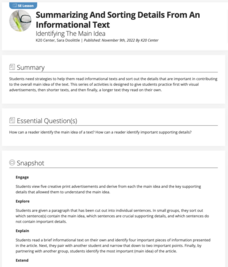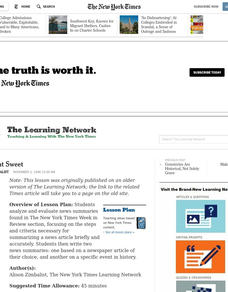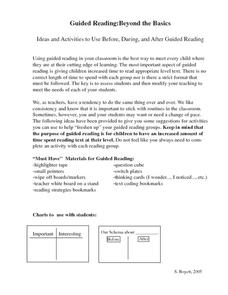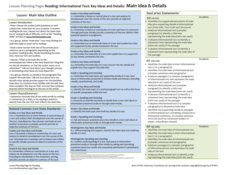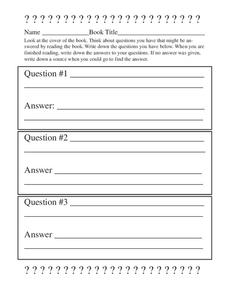Mary Pope Osborne, Classroom Adventures Program
The Backpack Travel Journals
Strap on those backpacks, it's time to travel through history with this literature unit based on the first four books of The Magic Tree House series. While reading through these fun stories, children create story maps, record interesting...
Baruch College Writing Center
Summarizing, Paraphrasing, and Quoting Workshop
What's the difference between summarizing and paraphrasing? Show class members how to find the main ideas from informational text and condense it, restate it, or quote it directly with a series of educational activities based on two...
Ontario
Reading Informational Text
Learning to recognize the importance of the features of information text (i.e., titles, subtitles, endnotes, sidebars, etc.) is the focus of a reading activity designed for middle schoolers. Learners examine how these text features help...
K20 LEARN
Summarizing and Sorting Details from an Informational Text: Identifying the Main Idea
Scholars participate in two activities that teach them to identify the main idea and key supporting details in informational text. Partners create a visual that reflects the main idea and key supporting details in an informational text...
Curated OER
Short But Sweet
After analyzing and evaluating news summaries found in the New York Times "Week in Review" section, middle schoolers study the steps for summarizing a news article briefly and accurately. They write two news summaries: one on a newspaper...
Ideas From Suzi
Guided Reading: Beyond the Basics
Elevate children's reading comprehension skills with this collection of guided reading resources. From paper dice with basic comprehension questions printed on them to a system for using sticky notes to identify key parts of a story,...
Texas Center for Learning Disabilities
Second and Third Grade Explicit Phonics Intervention
Support all young learners on their journey to literacy with this five-lesson reading intervention unit. Following a clearly outlined format, each lesson first engages children in practicing their phonemic awareness and phonics skills...
Florida Center for Reading Research
Comprehension: Monitoring for Understanding, Simple Summary
Can your class sum up a text in a few sentences? Help them build this skill by starting nice and slow. For this summarizing activity, the teacher marks the main ideas with sticky notes. Learners read and reread the text, pausing at the...
Curated OER
In God We Trust; All Others Pay Cash
Learners review their knowledge on the First Amendment. After reading an article, they identify specific church and state issues. Using the Internet, they research President Bush's proposal from a specific point of view. They summarize...
For the Teachers
Main Idea Outline
Find the main idea in an informational text with a versatile lesson. Three levels of differentiation help you implement the strategy in any age or class level, based on the ability and objectives of your learners.
Polk Bros Foundation
Common Core Constructed Response Organizer
Get your writers ready to compose a constructed response essay in response to either an informational or fictional text. Pupils note down the big idea they wish to address as well as up to nine examples from the text that they wish to...
Ideas From Suzi
Responding to Literature
Guide your class through a text with resources for before and after reading. Learners ask questions, discuss characters and plot points, point out elements of the reading that stood out, and compose brief summaries.
Curated OER
Researching the Past
Learners research the western movement in order to learn note taking strategies with nonfiction texts. They use the Internet to search for important information about the western movement using the Cornell Notes note-taking system. They...
College Board
Evaluating Sources: How Credible Are They?
How can learners evaluate research sources for authority, accuracy, and credibility? By completing readings, discussions, and graphic organizers, scholars learn how to properly evaluate sources to find credible information. Additionally,...
Polk Bros Foundation
Science Learning Summary Guide
Apply reading standards to your science curriculum by asking pupils to complete this guide. Individuals note down important vocabulary as well as two ideas they learned and two supporting facts for each idea. They then take this...
Curated OER
Mini-Lesson Planning for Inferences
Making inferences and drawing conclusions is a key component to successful active reading. Encourage your class to use context clues and prior knowledge to infer different elements of a story, including the setting, plot, and character...
Curated OER
ELA Unit Planning Template Style One
Work with your department or on your own to create organized unit plans that connect to all parts of the Common Core standards. The three-page template includes space to summarize the unit, list standards for each category of the ELA...
Curated OER
Nonfiction Genre Mini-Unit: Persuasive Writing
Should primary graders have their own computers? Should animals be kept in captivity? Young writers learn how to develop and support a claim in this short unit on persuasive writing.
For the Teachers
Story Strips Sequencing
What happens next? Work on story sequence with a lesson plan that prompts kids to put a story back in order. Additionally, they discuss what would happen if one event was missing from the sequence.





